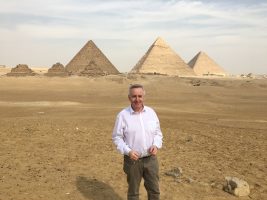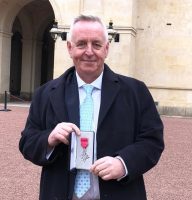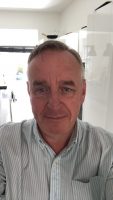Ged Byrne remembers very clearly the date of his first international placement on 4 October 1988. This was to be a date that has impacted greatly not only on the rest of his career but on health services throughout the world. As a medical student in 1988, Ged was undertaking a three month elective period of study in Madras (now Chennai), India flying via Kabul. Ged admits that his reasons for wanting to go to India were probably not the norm: his uncle used to regale him with tales from his work as a baker on the British India Shipping Line, making him have an urge to see that part of the world. His path to medical school was also somewhat atypical as he came from a working class family. Fortunately for him his teachers identified him as being “OK academically” and suggested he become a priest or a doctor, so paving paved the way for scholarships for him to continue his education beyond the mandatory 16 years.

From flying out with a vague notion of tourism, Ged became absolutely fascinated by different clinical environments and his passion for international work was fuelled as he asked himself questions such as “How do you manage in resource poor settings? How do you manage challenge? What does resilience really look like? How do you make things happen in a in a country where you can’t understand 90% of what people are saying?”
These questions have continued to intrigue him throughout his career highlighting difference between the NHS and the public health service of Tamil Nadu where the main gates of the hospital were locked at night and opened at six in the morning “when you just get hundreds of people pour through with their families”. The triage tables were set up in the courtyard and the day’s work began.
Somehow, he managed to fit in time to play golf during this placement with an Indian medical student. After completing his Senior House Officer rotation, Ged headed back to the same hospital for a second stint, working with the health teams in Madras mainly in triage and operating theatre but elsewhere when required. Now, thirty years later, Ged has made almost 100 trips to the subcontinent for work purposes as well as to every other continent except for Antarctica but nothing compared with that first “metacognitive mind-blowing experience”.

Ged is a firm believer in the three pillars of education: the curriculum, the person who teaches it and the place of learning. For the third f these pillars he asserts that the NHS is “second to none” but because of the sheer volume of work, it was wonderful to learn many clinical skills in places such as Chennai. However, his initial and subsequent experiences have all served to reinforce Ged’s belief that health is a global phenomenon. Because of this he established a global health unit within Health Education England maintaining that international placements should be available and accessible to all health professionals during their undergraduate programmes. He maintains, “The mutual learning that practitioners can experience can only be of benefit to both countries and broaden understandings of how others do things, while improving the clinical skills of those involved”.

One of Ged’s current projects is to work with countries such as India, Pakistan, Indonesia and Sri Lanka to train more and more of their “untrained and uneducated population to become health and public sector workers”.